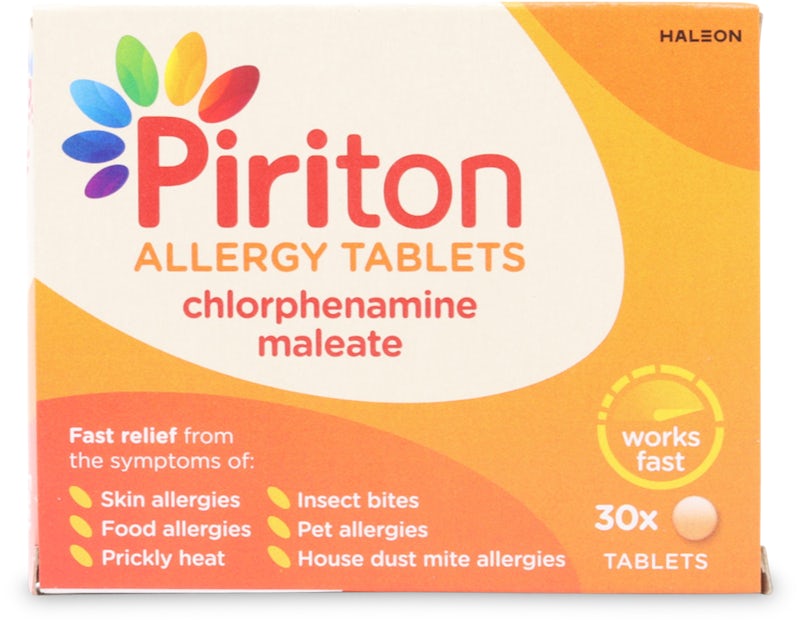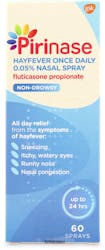Piriton Allergy 30 Tablets
Piriton Allergy 30 Tablets
All sizes
What 500,000+ customers say about medino:
Description
Piriton tablets relieve symptoms of various allergies, such as hay fever, pet allergies, nettle rash (urticaria), food allergies, and reactions to insect bites or medicines. It is also used to relieve symptoms of a more serious allergic reaction called angioneurotic oedema, which causes swelling of the eyes, lips, tongue or throat, as well as itching associated with chickenpox.
Key features:
- Antihistamine tablets, for hay fever and allergies
- Contains 4mg of chlorphenamine maleate
- Helps to stop symptoms such as itching, redness, swelling and more
- Also helps to soothe itchy rashes
- Easy-to-take tablets
- Pack of 30
What is the active ingredient in Piriton Tablets and how does it work?
The active ingredient in Piriton Tablets is chlorphenamine maleate, an antihistamine that helps to relieve the symptoms of some allergies and itchy skin rashes. It works by blocking the action of histamine, a substance in the body that causes allergic symptoms such as itching, sneezing, and runny nose. Chlorphenamine can be used to treat hay fever, pet and house dust mite allergies, nettle rash, hives, and dermatitis. The tablet can be divided into equal doses and the dosage varies according to age and medical condition.
How long before Piriton starts to work?
Piriton usually starts to relieve symptoms within half an hour to an hour after taking a dose.
How is Piriton useful for relieving itching caused by chickenpox?
Piriton is useful for relieving itching caused by chickenpox due to its antihistamine action and the fact that it causes drowsiness. It may be especially helpful for itching that is worse at night, which is often the case in children who notice itching less during the day when they are active but are bothered by it at night when they are still and have nothing else to focus on.
Who can take Piriton?
Piriton can be taken by most people. The tablets are suitable for adults and children aged six years and over, while the syrup is suitable for adults and children aged one year and over.
What should I do if I forget to take Piriton?
If you forget to take your medication, take the missed dose as soon as you remember, unless it's almost time for your next scheduled dose. Do not take two doses at the same time, or take an extra dose to make up for the missed one. If you find that you forget to take your medication often, setting an alarm or asking your pharmacist for advice on other ways to remember to take your medicine may be helpful.
What is hay fever?
Hay fever, also known as allergic rhinitis, is a condition that causes symptoms similar to a cold, such as congestion, sneezing, itchy eyes, sinus pressure, and a runny nose. However, it is not caused by a virus, but rather by an allergic response to an indoor or outdoor substance that the body identifies as harmful. Common allergens that can trigger hay fever include pollen, dust mites, and pet dander. Hay fever can have a significant impact on your quality of life, but there are ways to manage the symptoms by avoiding triggers and finding the right treatment.
Can you take Piriton Allergy Tablets when pregnant?
Unfortunately, these aren’t recommended while you’re pregnant. Even though there’s no firm evidence to say it could be harmful, there’s not enough information to be sure it’s safe – so we recommend you don't take Piriton hay fever and allergy tablets when pregnant.
How long do Piriton Allergy Tablets take to work?
Tablets usually take 30 minutes to an hour to work, but this may differ from person to person.
How often can you take Piriton Allergy Tablets?
Adults and children over 12 years old can take one Piriton hay fever and allergy tablet every four to six hours, and no more than six Piriton 4mg tablets in 24 hours. If you’re over 65, you should chat to our pharmacist or your GP before taking Piriton Tablets, as you may need to take a lower daily dose.
Ingredients
What is the active ingredient in Piriton Allergy 30 Tablets?
Piriton Allergy 30 Tablets contain an antihistamine called Chlorphenamine Maleate, which blocks the histamines your body produces when you experience an allergic reaction.
Each tablet contains 4mg of Chlorphenamine Maleate and also includes Lactose.
Usage and Instructions
Always read the label.
| Age Group | Dosage | Maximum Dosage | Notes |
|---|---|---|---|
| Adults and children aged 12 years and over | Take one tablet every 4 to 6 hours as needed. | Do not take more than 6 tablets in 24 hours. | |
| Children aged 6 to 12 years | Give ½ tablet every 4 to 6 hours as needed. | Do not give more than 6 half tablets in 24 hours. | |
| Elderly | Talk to your doctor or pharmacist before you take this medicine. | Maximum daily dose: 3 tablets (12 mg) in any 24 hours. | May be more likely to get side effects including confusion and may need to take a lower daily dose. |
Warnings
Does Piriton make you drowsy?
Piriton Allergy 30 Tablets will usually make you feel a bit sleepy or drowsy. This effect usually wears off four to six hours after you’ve taken a dose.
What is the difference between Piriton and Piriteze?
Even though Piriton and Piriteze are both antihistamines, they contain different active ingredients. Piriton contains chlorphenamine maleate and Piriteze contains cetirizine. If you’re unsure which is best to use for your specific allergy symptoms, chat to our pharmacist who’s happy to help with expert advice.
Are there any other warnings?
You should not drink when taking Piriton tablets.
Do not drive or operate machinery if you feel sleepy or drowsy after taking Piriton 4mg tablets.
If you have been told by your doctor that you have an intolerance to some sugars, contact your doctor before taking Piriton Allergy Tablets.
Do not take Piriton Allergy Tablets if:
- You have ever had an allergic reaction to antihistamines or to any of the ingredients.
- You have taken monoamine oxidase inhibitors (MAOIs) prescribed for depression in the last two weeks.
- You are taking other medicines containing other antihistamines, including products for the relief of colds and coughs.
Talk to your doctor or pharmacist before taking Piriton Allergy Tablets if:
- You have very high blood pressure, heart disease, epilepsy, glaucoma, enlarged prostate, liver disease, bronchitis, asthma or bronchiectasis.
- You are pregnant or breastfeeding.
- If you are taking any prescribed medicines; particularly phenytoin (for epilepsy) or medicines for anxiety or to help you sleep.
Side Effects
The following are some of the side effects that are known to be associated with chlorphenamine, the active ingredient in Piriton tablets. Just because a side effect is stated here, it doesn't mean that all people using Piriton will experience that or any side effect.
Very common (affect more than 1 in 10 people)
- Sleepiness or sedation.
- Common (affect between 1 in 10 and 1 in 100 people)
- Blurred vision.
- Dry mouth.
- Feeling sick.
- Difficulty concentrating.
- Problems with coordination.
- Dizziness.
- Headache.
- Fatigue.





